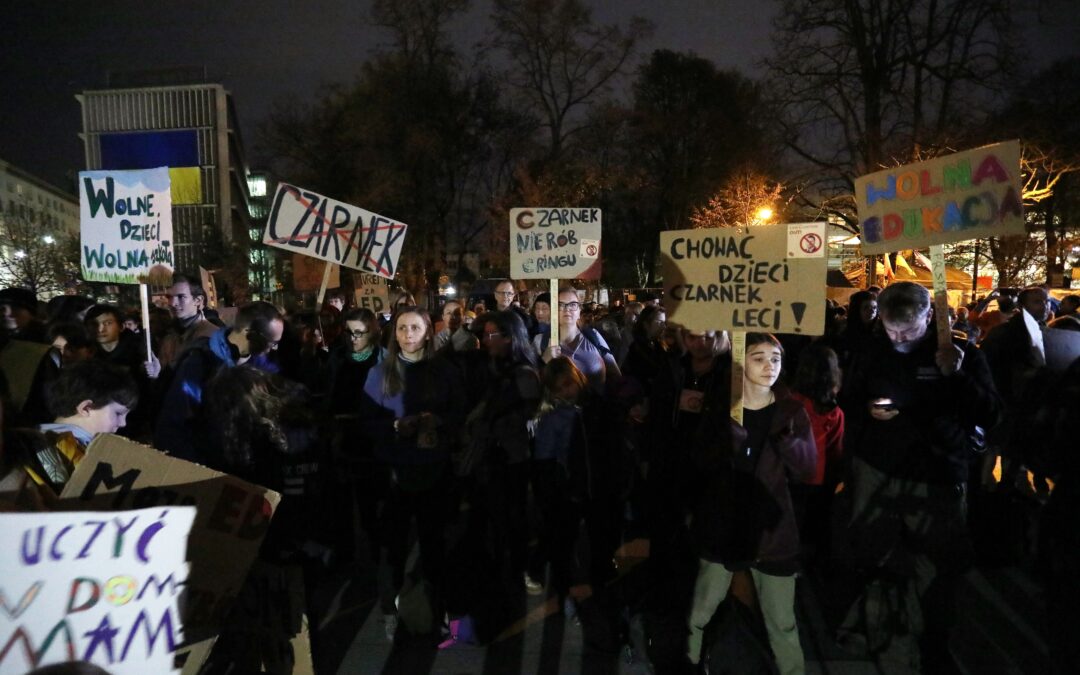There were protests both inside and outside parliament yesterday as the ruling Law and Justice (PiS) party resumed efforts to pass a law centralising control over schools, which critics say would allow the government to enforce its ideological agenda in the classroom.
The bill in question – similar to one vetoed earlier this year by President Andrzej Duda – last night passed its first legislative hurdle after being approved by the education committee. Had all opposition members of the committee been present, however, the vote would have been lost.
Those opposition figures that were in attendance displayed signs saying “Lex Czarnek Out”, referring to the bill’s unofficial name. Przemysław Czarnek, the ultra-conservative education minister, has previously said that the reforms are needed to “protect children from moral corruption”.
Outside parliament, hundreds of demonstrators waved banners saying “Free children, free schools” and “This government is a mistake”, reported Radio Eska.
Dzieci i ryby mają głos. Jesteśmy pod Sejmem w obronie wolnej szkoły. Dziś projekt #lexCzarnek
znów jest procedowany. Podpisz Petycję! https://t.co/1v3XZQrsv2
@wolnaszkola_org #wolnaszkoła pic.twitter.com/PXS1VVOnkk— Amnesty Polska (@amnestyPL) October 25, 2022
The bill would allow government-appointed provincial education superintendents to suspend headteachers if they conclude there is an “urgent threat to the safety of students during activities organised by a school”, notes news outlet OKO.press
Schools would have to submit details of extracurricular activities for the superintendent’s approval at least two months before they take place. The legislation also introduces additional hurdles for seeking the consent of parents for such activities.
Opponents of the measures say they are intended to prevent certain outside groups – such as sex educators or those speaking about LGBT issues – from entering schools.
Czarnek has been one of the government’s most prominent campaigners against what they call “LGBT ideology”, which he claims “comes from the same roots as Nazism”. He has also pushed for restrictions on “morally corrupting” sex education.
Earlier this year, a similar bill, also dubbed “Lex Czarnek”, was approved by parliament. However, it was then vetoed in March by Duda, normally a PiS ally, who argued that the country needed “unity and agreement” following Russia’s invasion of Ukraine.
Czarnek said at the time that a new education bill would be drawn up “with minor amendments, consulted with the president’s office”. Last Thursday, that bill was submitted to the lower house of parliament, the Sejm, by a group of PiS MPs.
It was criticised by opposition leader Donald Tusk – who accused PiS of “wanting to change the brains of our children” – and the head of the largest teachers’ union Sławomir Broniarz, who warned that “a struggle for the autonomy of schools awaits us”.
The education minister, however, told reporters that he does not understand how people can “have anything against pupils’ parents…learning of the content that will be delivered to pupils” before outside groups are allowed into schools.
Following a heated discussion in the parliamentary education committee, the bill was approved by 16 votes to 15. However, four opposition members – two from Tusk’s centrist Civic Platform (PO) and two from The Left (Lewica) – were absent, notes Onet. Their presence would have swung the vote.
One of the absentees, PO’s Maciej Lasek, blamed “the poor organisation of parliamentary work” as he had been simultaneously required to attend a session of the defence committee.
To są jakieś jaja… #lexCzarnek mogło już dzisiaj pójść do kosza, ale nie… Parlamentarzyści @Platforma_org i @__Lewica nieobecni. Brakło właśnie tych czterech głosów! A ludzie strajkują pod Sejmem na mrozie i w ciemnościach. Tfu takie sprawstwo #znowuTOsamo pic.twitter.com/E5ELlOdGig
— Łukasz Krasoń (@LukaszKrason) October 25, 2022
A further provision in the bill would make it more difficult to provide home schooling. Until now, parents have been able to decide to switch to home education at any time during the school year. The new measures would restrict this possibility to a limited period, reports news website Gazeta.pl.
Victoria Bieniek, a mother of two children aged seven and eight who are being home-schooled in Warsaw, told Notes from Poland she believes this part of the new bill is also ideological in nature and designed to make life more difficult for people who favour education at home.
“It is an attack on the freedom home-schooling offers and will de facto indoctrinate children, forcing them to learn from, and be examined on, prescribed textbooks which put forth a manipulated interpretation of Poland’s history, specifically playing into ruling party politics,” she said.
Estimates of the number of children being home-schooled in Poland at the end of September ranged from 30,000 to 37,000, according to news service Interia.pl.
Main image credit: Slawomir Kaminski/Agencja Wyborcza.pl

Peter Kononczuk is senior editor at Notes from Poland. He was previously a journalist for Agence France-Presse (AFP) in London and Warsaw.




















